For those not in the know, it might seem that Irish actress Evanna Lynch has kept a low profile after the fame that came with playing Luna Lovegood in the Harry Potter movies.
But that is absolutely not the case.
Evanna is using her platform and her passion to educate people on living a cruelty-free life, particularly through her podcast The ChickPeeps, co-hosted by former Harry Potter actor Robbie Jarvis, environmental activist Momoko Hill, and founder of The Protego Foundation-- an animal rights group inspired by the wizarding world-- Tylor Starr.
The second season of The ChickPeeps launches today, November 1st--aka World Vegan Day, and Evanna tells us what to expect from the new season, how she became vegan, if her on-screen alter ego Luna Lovegood would do the same-- with a few classic Irish mammy stories for good measure.
In her own words, Evanna tells us about her journey into activism.
On veganism:
"I went vegetarian really young.
I was always grossed out by the idea of meat.
My mum told me that when I was a kid I wouldn’t let her walk down the meat aisle because I hated the blood, and that was before I even consciously knew what it was.
When I was 11 or 12 I started really thinking about what I was eating and where it came from, and it just kind of disgusted me that this was someone’s flesh-- that this was their body, so I stopped.
"But I wasn’t a very good vegetarian—I was a junk food vegetarian! I didn’t like vegetables, I wouldn’t eat salad. It was mostly pasta, pizza, Weetabix, sometimes a bit of fruit, so whenever veganism came up I thought ‘I couldn’t do it—I would die’.
But I started to talk about animal rights and welfare, and people started asking 'Why are you not vegan?' and I didn’t really have an answer except that it’s hard. But I felt like I should read about it, and I read a book called Eating Animals [by Jonathan Safran] and I was so upset by it.
"And I thought, 'This is how I feel just by reading about it, just imagine that this is going on all the time'. Many millions of creatures are living this hell every day, and I thought ‘I don’t want any part of this’.
Then I knew I was vegan in my values and sensibilities and from then it was just about going vegan, which wasn’t easy.
It took a while. I definitely had a few relapses of going back to vegetarianism, but I never went back to eating meat.
"But this is what I would tell anyone who wants to go vegan:
Read about it.
I would force myself to read those shocking accounts because the more I read the more I realised I couldn’t see that stuff as food.
When you first hear about it you think ‘I should be vegan’ rather than ‘I want to be vegan’. You have to uncondition yourself, because we’re conditioned to not think about it, to not see it—I had to remind myself that this is really what’s happening.
The more I did that the more I realised I didn’t want this anymore.
"My friend taught me about the ‘crowding out’ method: rather than seeing veganism as giving things up, look at it as just a new way of eating, as a different type of cuisine. Don’t cut anything out, just introduce new things to your diet and then you can gradually let the animal products fall out of your life.
That really worked for me.
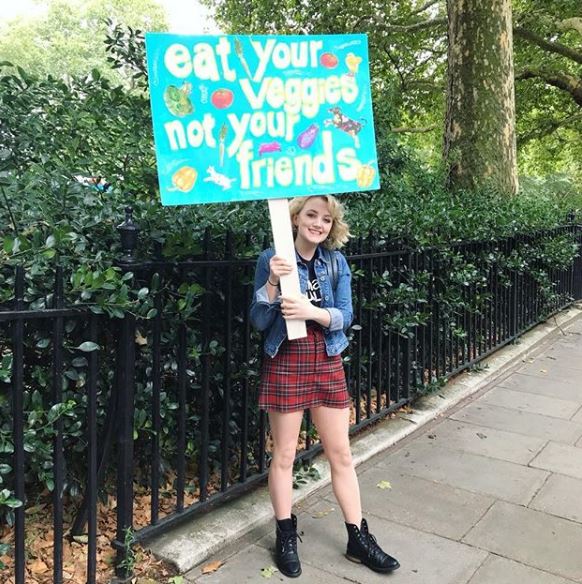 (@msevylynch / Instagram)
(@msevylynch / Instagram)"But then every time I would go home, my mum-- because she’s an Irish mammy-- wanted to cook my favourite food, because that’s how she expresses her love!
She would always make this cherry cake which I’ve loved since I was a kid. And one day I came home and I said 'I cant eat this mum, it has eggs in it!', and she just couldn’t conceive that she could make a cake without eggs and she was really sad for a while.
But one day we looked up a vegan cherry cake and it was great, and that’s what she does now.
Chocolate was the main thing I missed. I still get cravings for sweet things. People say you don’t have to have sweet things every day—I don’t agree with that!
But recently I was at dinner at a fancy restaurant where the food was these tiny little bitty things. And the vegan dessert was a ‘berry medley’ and the waiter said “Here you go madame, you may share if you like”—but it was just berries! 'Berry medley'! I was like, “No, I’m going to eat this berry medley all to myself, thanks!”
So at birthday parties and that I tend to bring a vegan sweet dish myself and share it around.
For my sister’s hen party I was tasked with making the cupcakes and I made them vegan. I didn’t say anything but afterwards I was like “They’re vegan by the way!” People don’t notice—no one has that refined a pallet.
On The Chick Peeps podcast:
I’ve always loved Podcasts. Before I was in Harry Potter I used to listen to MuggleCast and The Leaky Cauldron—and this was about 15 years ago when podcasts were barely even a thing. You were listening to it on a computer—it was really nerdy.
And I loved that. I was a nerdy kid.
I would go on the internet and talk to fans. I didn’t really have a sense of community in my life and the podcast community for me was like “You have friends!” Which sounds sad but it’s people who get you and who you feel understood by.
So when I first went vegan it was very isolating. You’re the odd one out, and no one wants that, everyone wants to feel like they fit in somewhere.
Once I started talking about this stuff publicly I started being interviewed by vegans who had been doing this for 20 or 30 years-- experts and activists who had devoted their lives to animal rights, and I realised I wanted to talk to them and ask them questions, and to create a podcast where it doesn’t feel like its about perfectionism.
Because there are so many people who are sympathetic to veganism and want to do it but they find it hard and or they don’t know how.
So I wanted to create an environment where people weren’t afraid to ask these questions, or talk about, say, honey-- why is honey not vegan? Why is this cruel?
"It’s not black or white, it’s about discussion.
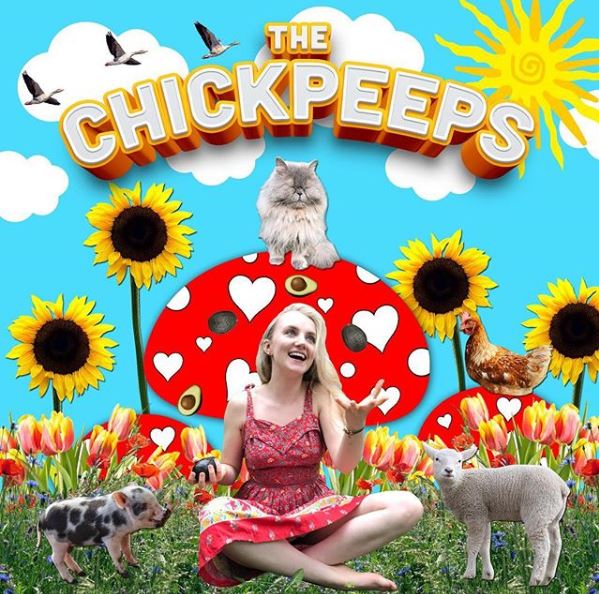 (@chickpeepspod / Instagram)
(@chickpeepspod / Instagram)[Co-host of The Chick Peeps] Robbie and I were already friends, and he was vegan. [Co-host] Tylor runs the [animal rights group] Protego Foundation, so he was an obvious choice.
And [Co-host] Momo is vegan from a spiritual angle. I thought we had a nice balance there.
A lot of vegan podcasts are brilliant but they’re really information-heavy, like 'heres the rules and here's what you do'-- I wanted one a bit more vulnerable and human that feels like you’re hanging out with friends.
"Something where we have a laugh, maybe we learn some things, maybe we ask some questions. I think that’s what’s different about our podcast—it’s hangout vibes.
I have more conviction now just from asking those questions. I have more compassion for where everyone’s at in their journey. I understand the importance of non-judgement as an activist, leaning to listening to people as well as to animals.
"Nobody will listen to you if you’re judging or criticising them.
Like for example, a few weeks ago I went home to visit my baby nephew. I thought he was gonna be vegetarian-- I assumed that. My family are mostly vegetarian, they eat a bit of fish now and then but they’re very into it now.
But I found out he was eating red meat and I was so shocked and upset, because he was playing with a Noah’s Ark and playing with little cows—and I said it's brainwashing him, telling him this one is food but this one is a friend.
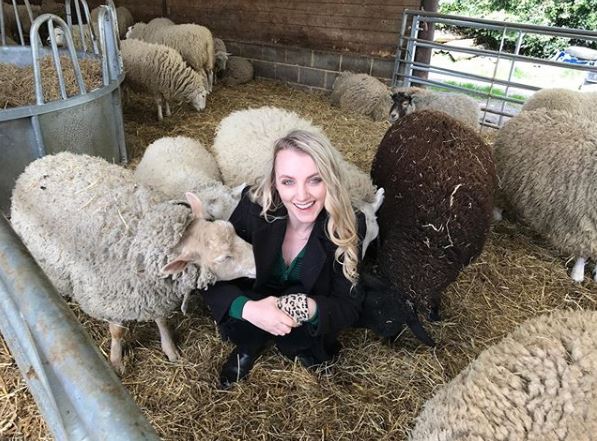 (@msevylynch / Instagram)
(@msevylynch / Instagram)So I got upset and I said to my sister 'How could you do that?'!
And in retrospect I came at it with so much emotion and of course—this is her baby! She’s been putting all of her energy into raising her baby and she really believes that they need red meat. I don’t know where she got that from—just the conventions of society. But it turned into a fight.
We have people who reach out to us who are curious, and a lot of vegans would get on their high horse and say 'You need to make this change, it’s not hard!', but it is.
Everyone has a really personal relationship to food. A lot of it is to do with their cultural identity, with their family, and that’s a huge thing that can’t be underestimated.
People like dairy farmers—they have five generations or more who have all done this. It’s a sense of identity.
So the podcast has taught me on the human aspect, it’s personable.
On backlash and social media:
I try not to let myself get pulled into the comment section too much now.
There’s so much propaganda-- studies that are funded by the meat and dairy industry to spread misinformation and undermine the health and environmental benefits of veganism.
The other day I posted something-- a campaign about how McDonald’s treat their chickens really badly.
And somebody was going on in the comment section about how the conditions for chickens have all been exaggerated and I was going to reply, but at the end of the day, these animals are slaughtered when they’re 4-6 weeks old. There’s nothing humane about that, there’s nothing good about that. We don’t need to do that.
I stopped arguing online—and I know a lot of activists who do it, and they’re really good at it—but I think these commenters don’t want their minds changed. They want to state their opinion and they want to be right.
And it becomes a battle of egos rather than wanting to learn about anything.
So my focus is on education. If I do a post I try and explain it clearly.
On the podcast we do our research, we talk about the topic and then I peace out on the situation.
"It’s important to be protective of your energy.
"There are so many nice, kind, intelligent people I’d rather discuss it with.
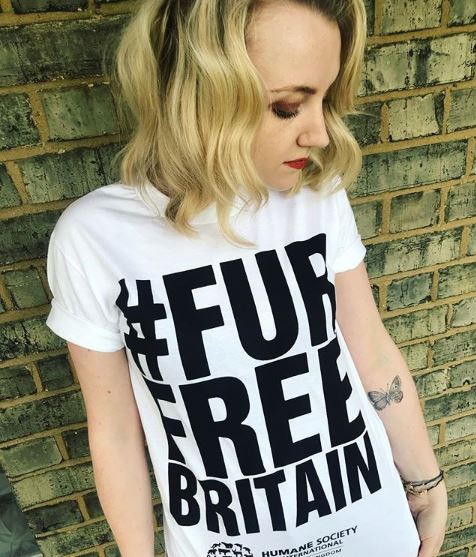 (@msevylynch / Instagram)
(@msevylynch / Instagram)Social media is like that—you get so many nice comments and then one mean one, and the mean one is the one you want to reply to!
But if I’m not going to give my time and energy to the people who are spreading love and kindness, I shouldn’t be giving attention to the people who are being mean. It’s not sending a nice message—‘if you’re rude to me I will engage with you’.
[On winning the Lovie Internet special achievement award]
I am really pleased about that! I was surpised, but I’m really happy to be able to raise awareness for veganism through social media and through the internet. I think when I first started talking about it I thought 'Agh, I’m gonna lose loads of fans, this is too controversial, people just rely on me for Harry Potter stuff', but it’s been really nice that people have been so curious to learn about this.
I think the internet is such a brilliant way to share with people in a way that’s not too pushy and where they can read as much as they want and ask questions and engage.
So I’m really pleased and I hope this will get more people thinking about veganism and asking about it and not being too intimidated by it.
On Ireland:
"Ireland is getting really good for veganism!
"The Happy Pear have been brilliant.
My mum loves them! It’s so embarrassing—they brought me and mum around their factory, and as we were leaving she kissed one of them on the mouth! I was like 'Oh my God, mum!'-- and she was like, 'No he tried to kiss me'!
And I said 'No, you’re a 60 year old lady, I’m pretty sure he didn’t'! And my dad was there too so that was the funny part.
But I think The Happy Pear are brilliant. They’re so positive.
Agriculture in Ireland is such a big part of our cultural identity. I think if you were to start talking about the ethics it can be quite polarising, and people feel threatened—so the fact that The Happy Pear are just like 'Here are some amazing brownies we made!', it gets a lot of love.
And they do the Swimrise thing where they invite the community down to swim with them and they give out porridge and stuff—and it’s all about community and family and love, and I think that’s the Irish way. They’re making it exciting and lovely and people want to be a part of that.
[For vegan food in Ireland] Cornucopia in Dublin is so amazing—it’s like real Irish food, with big potatoes, and they properly heap your plate and you can get a selection of three or four things and they just pile it on and it’s delicious.
My mum does an amazing vegan sheperds pie. She calls it Sheperdess pie—I don’t know why.
But it’s delicious, it’s got lots of different beans and stock and a big layer of potatoes. I’d like if more places did that.
[On the ‘American twang’ in her accent] My accent definitely gets stronger around Irish people. It’s not conscious, I think it’s more about being understood.
As an actor and am emphatic person, whatever accent I’m around I adjust just a little bit so we can understand each other better. And I think also I like the American accent. It’s friendly, it’s confident—and at first [when I moved to America] they were like 'Sorry? Say that again?' So you have to adjust your accent.
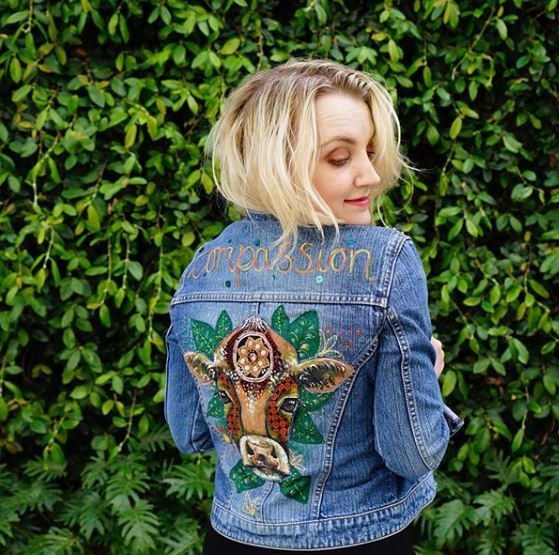 (@msevylynch / Instagram. Jacket by @rekindleclothing)
(@msevylynch / Instagram. Jacket by @rekindleclothing)On Harry Potter:
I feel really privileged to have been part of it. It was such an incredible time and opportunity. It’s not something I’ll ever be ashamed to have been a part of.
It’s really respected, there’s such brilliant writing, such deep and loveable characters. I’m really proud to be a part of it.
And I have such a deep respect and love for Luna. Still when I read that character it’s transportive. It’s not me, it’s someone who inspired me.
There’s something about her that makes me feel at peace and okay with myself and okay with the world.
And I tend to meet really interesting people because she’s such a quirky unusual person.
Like recently I started doing aerial stilts, like circus skills, and I met a girl in there who is just so cool—and she recognised me, and I thought, ‘Of course you relate to Luna Lovegood’, because she was so quirky and unusual and cool, so I get to meet really interesting and like-minded souls.
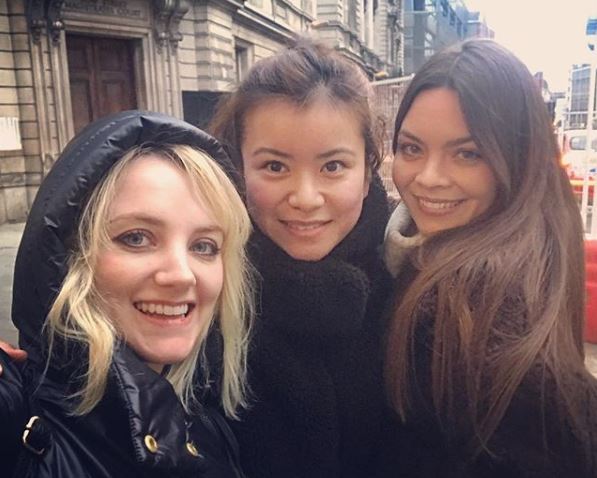 Evanna with Katie Leung (Cho Chang) and Scarlett Byrne (Pansy Parkinson) (@msevylynch / Instagram)
Evanna with Katie Leung (Cho Chang) and Scarlett Byrne (Pansy Parkinson) (@msevylynch / Instagram)[On favourite animals in the Wizarding World]:
Hinkypunks! They haven’t made it into the films yet but I love the idea that they have a little light and they hop along. I like the mischievous beasts.
I love the Bowtruckles in the movie, they’re so sweet and funny.
But the one I was terrified of was the Lethifold. It goes over you in the middle of the night and it eats you in your sleep. It devours you—and it doesn’t even seem to have a face. And when it eats its victim it gets thicker! JK Rowling definitely has a dark side of her imagination.
[On if she could create a spell, what it would do]:
I would give animals the power of human speech.
That’s the one block in communication. If we could talk to animals-- like in Parseltongue, but for all animals-- if we could understand them or if they could speak a language I just think that would change everything.
But even now you can see cows crying when their babies are taken away, and elephants cry tears, they even have little funerals.
The only excuse we have is that people say animals don’t feel as deeply or they’re not as intelligent, but I think if they could communicate in words that would change everything.
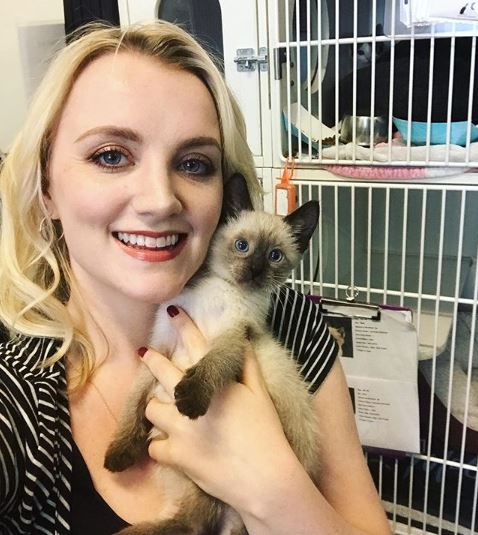 (@msevylynch / Instagram)
(@msevylynch / Instagram)[On veganism within the rest of the Harry Potter cast] "Jessie Cave, who played Lavender Brown, is vegan.
She has two kids and she is raising them vegan—she’ll be on the podcast in season 2 talking about parenting as a vegan.
And Katie Leung who played Cho Chang is vegetarian—she watched Okja on Netflix and it was so beautiful and sad and she turned vegetarian straight away.
Then Bonnie Wright [Ginny Weasley] is mostly vegan—she’s an environmental activist, she does a lot of campaigns about cutting out plastic and being zero waste, and those causes tend to overlap a lot. Bonnie is going to be on the podcast too for season 2!
So a lot of females—none of the males yet. But Devon Murray [Seamus Finnegan] loves animals and I see him posting animal welfare campaigns online.
It comes up sometimes because we do conventions together and there might be a question about vegan options and he’ll be like “Ah I could never do that”—so he has a blind spot there.
[On if Luna would be a vegan]
Luna has a deep affinity with animals. Like her, they’re kind of discriminated against because they’re a bit different. We don’t really understand them, like we don’t really understand her and her funny ways.
And I think animals have that quality of just accepting people without looking at what they offer or how they look or how rich they are. She’s like that—she sees the soul the way animals do.
And spiritual people talk about how you shouldn’t be ingesting someone’s suffering and pain—all of those animal products are full of adrenaline and fear and bad hormones—or bad energy if you want to get a bit more spiritual about it—and I see Luna as a deeply spiritual person.
I don’t think she could see a piece of meat and not think about the torture and the pain and all that. So I would definitely say she is vegetarian, I can’t imagine her not being that.
I think being vegan would be a bit tricky in the wizarding world—you know the way the Hogwarts feast is described in the books, it’s such traditional English food, like stodgy pub food—so she might have to bribe some House Elves!
The first episode of The Chick Peeps season 2 is out today, Friday 1st November—World Vegan Day!-- and is available on Spotify, iTunes, SoundCloud and the website, which you can find here.

